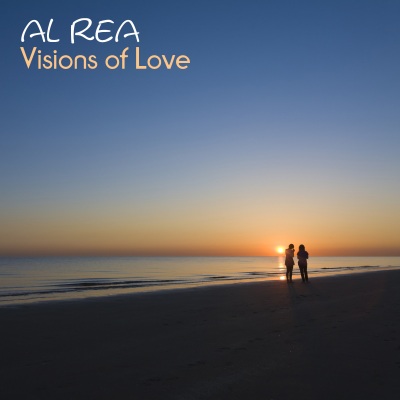
Visions of Love
Album review by Nick DeRiso Smooth jazz that's been smoothed even further out, Al Rea’s Visions of Love has a glassy tranquility – almost to the point, at times, of sounding like space music, and just as mesmerizingly relaxing. Perhaps the best example is the beautifully fragile "Deeply True Love", Rea’s most emotional rumination here at the piano. "Island Breath" also uses the area around the music to great effect, then fills that echoing silence with a delicately inviting guitar. "Michigan Farewell", meanwhile, follows a path from darkness to almost anthematic light, with Rea playing piano in front of little else besides a clattering backbeat. “Seaside Eve” explores an arctic soundscape, with only a flinty synth to distract from the chill. The album’s best moments, though, combine this concept of cool placidity with more offbeat textures. The title track is, on its surface, lightly propulsive – with a smart modern cadence, and an R&B-infused groove. But Rea works in counterpoint with a series of keyboard flourishes, giving the tune a dreamy quietude. "Curiosity" similarly employs a thudding dynamism that at first recalls hip hop, yet there is a gently trickling piano figure running across its middle. A waterfall of synthesized sound begins "Dancing on the Moon", before Rea’s snappy electronic rhythms join the proceedings – but it is that initial sweeping keyboard which continues to define the tune, giving it a cerulean quality. "Indian Summer" works in similar juxtaposition, when a narrative electronic accompaniment – almost like a solo by lonely French horn, at times – combines with a jaunty rhythm straight out of Stevie Wonder’s golden era. Tracks like "Forever You" and "Sun on My Skin" explore more overtly classical influences, with a compliment of shuddering strings in both cases tangling and untangling with a contemplative piano. "Sun on my Skin" after a turbulent beginning, is the more resonant of the two – with a deliberative solo turn that cuts across the innate stoicism of its own chamber-music ambitions. "Moments" is the album’s straight jazz moment, as a swinging cadence and riffy guitar give way to these angular piano fills. Rea then adds a sneaky rebuttal on the keys, sounding like a pair of garrulous brass men. "Piano Bar",in a fun twist, is that song’s polar opposite – as Rea slows things down to a quiet-storm pace, offering only a few genial addendums at first at the keyboard, before finally welling up into a smartly romantic statement. In this heady environment, Rea can bring in a stunning series of influences. "Sweets Around Me", festooned with a host of ricocheting rhythms, finds Rea combining both acoustic and synthesized sounds to create a throwback 1970s-era fusion-jazz sound. Then there's "Take My Hand", which could have worked as a backing track to the next big Owl City hit, so catchy is its unadorned sense of optimism. "The Game" includes a plucky bass line that recalls Earth Wind and Fire, though once again Rea moves well outside of that funky set of expectations with a swooning keyboard interlude. The driving closing track, “Believe in You,” has the arid pulse of 1980s dance music, and a circular keyboard structure straight out of the Pet Shop Boys. Not everything on Visions of Love strikes such a perfect balance. Songs like "Delicious Day" and "Imagination", for instance, feel too plasticine to be soul yet it’s too busy to match the album’s earlier sense of considered calm. The computerized rhythms on "Circus" are pushed so far up in the mix that they distract. Still, those rare missteps do nothing to take away from this offbeat, deeply creative album's other, more fully realized successes. Reviewer: Nick DeRiso Rating: 4 stars Nick DeRiso, writing from various kudzu-covered locales across the Deep South, has explored jazz, blues, roots and rock music for Gannett News Service and USA Today, the Louisiana Folklife Program, AllAboutJazz.com, Blogcritics and for his own SomethingElseReviews.com. Over that 20-year career, he’'s interviewed B.B. King, Terence Blanchard, Clarence “Gatemouth” Brown, Marcus Roberts and Aaron Neville, among many others. His live-music venue once hosted the likes of Guy Clark and Rick Danko of the Band. (James McMurtry stopped by, too.) He’s also been programmer and host for a series of programs across the same genres, both on public and commercial radio.
